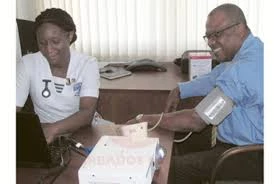Penicillin was discovered almost 90 years ago and heralded the beginning of a revolutionary era in medicine. As the first antibiotic drug in existence, it was used to treat what had previously been severe and life-threatening illnesses, such as meningitis, pneumonia, and syphilis.
Fast forward to 2014 and we’re on the verge of yet another revolution in health care - the data revolution! While there have been increases in data utilization to predict health trends at the global level through tools such as HealthMap , which analyzes news reports to detect infectious disease outbreaks, many countries continue to rely on paper-based records or aggregate data for information at the country and local levels.
Enter Barbados. Realizing that the country’s fragmented health data impaired its ability to perform comprehensive analysis and derive meaningful, evidence-based conclusions, the government of Barbados committed to developing and implementing a national health information system (HIS). Through the Second HIV/AIDS Project, supported by the World Bank, Barbados was able to finance the development of a HIS that began its data collection focused on HIV/AIDS and was then broadened by incorporating additional modules to support the overall health sector.
Nearly one year after having made the commitment to develop and implement an HIS, the government last month launched MedData. The project is the first step in bringing to life a national HIS, and includes seven modules.
Through these HIS modules, health care workers are able to access a patient’s chart across different health facilities and automatically identify a patient with important details on care decisions regarding release and transfer to other forms of needed care. Three of the modules facilitate tracking of pharmaceuticals and medical supplies at each health facility across the country, of a mother’s pregnancy through multiple antenatal care visits capturing key details on the labor and delivery stages, and of HIV client risk factors and history to aid in risk assessment and contract tracing.
The HIS modules also directly support clinicians by providing them with a live interface through which to provide instructions for the treatment of patients (particularly hospitalized patients) under their care and enabling them to order tests, receive notifications, and view both new and previous results related to a patient’s record. One of the HIS modules also helps with financial aspects by recording costs and prices for medical supplies, procedures, services, and administrative activities.
Minister of Health John Boyce stated, “Our belief is that with better information, better decisions can be made, leading to better health outcomes.”
In this first phase, MedData has already been launched at the Winston Scott Polyclinic and will be implemented at the Edgar Cochrane Polyclinic, Queen Elizabeth Hospital, and Ladymeade Reference Unit in the first half of 2015. In a second phase, the project will be implemented in the remaining six polyclinics throughout the second half of 2015. Parallel to the technical implementation, the government is also reviewing existing legislation to support HIS and developing a draft national HIS policy.
At the end of 2015, the MedData team plans to add a business intelligence component to the system. This would allow users to efficiently sort through and analyze large data sets to support decision-making with the aim to improve health outcomes and resource allocation. While information alone cannot be used to treat disease, it is being used to inform decision-making based on evidence supported by data.
As the quote often attributed to management guru Peter Drucker states, “what gets measured, gets managed.” This is the direction in which the Barbados health sector is headed. Indicators are measured, and data are captured and managed to inform policy-making in the health sector. The data revolution for health is here, and Barbados is at the leading edge.
Follow the World Bank Health team on Twitter: @worldbankhealth
Related
India’s Unique ID System: How Can It Improve Health Services?




Join the Conversation